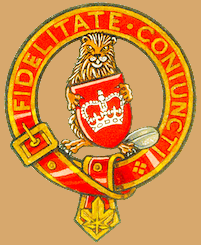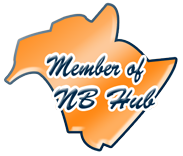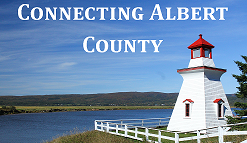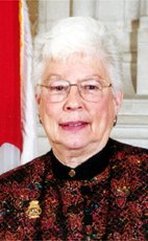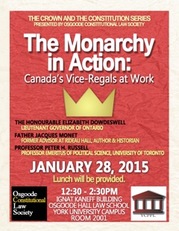
the Osgoode Constitutional Law
Society (OCLS) and the York Centre for
Public Policy & Law (YCPPL) held a
series of talks at Osgoode Hall Law
School on the topic of the Crown & the
Constitution. On January 28, 2015, we
held the second event in our speakers’
series, titled “Monarchy in Action:
Canada’s Vice-Regals at Work.” As part
of this event, Her Honour Elizabeth
Dowdeswell, the newly installed Lieutenant Governor of
Ontario, was joined by two eminent Canadian academics, and
experts in the field of Canada’s constitutional monarchy--
Father Jacques Monet, and Professor Peter Russell.
The following is a brief synopsis of each speaker’s
presentation. For those who are interested in the full hour and
a half presentation, I have included a link to the mp3 of the
event below.
Lieutenant Governor of Ontario
Her Honour began by discussing her role as the Queen’s
Representative in Ontario— an office which she described as
the product of a slow evolution from British colonial roots, to
its modern incarnation as the representative of the Crown in
Right of Ontario. The office represents our achievement of
responsible government, which Ontarians have enjoyed since
the 1840s. The Lieutenant Governor, representing the Queen
of Canada, is the protector of democracy and parliamentary
conventions in the province, and is hugely important to
understanding the historic and enduring relationship between
the Crown and Canada’s Aboriginal peoples.
The Lieutenant Governor has two principal constitutional
roles: (1) the legislative, representing the Crown in
Parliament; and (2) the executive, i.e. the Crown in Council.
Reading the Speech from the Throne, providing Royal Assent,
and granting requests for prorogation or dissolution of the
Legislature are all examples of the legislative role, while the
executive side includes the approval of Orders in Council for
the day-to-day governance of the province, as well as ensuring
that there is always a premier and cabinet to run the province.
In other words, the executive role is something akin to the
Chief Executive Officer of the province. Citing Walter
Bagehot, Her Honour continued by referencing the famous
three constitutional rights of the Sovereign and her vice-regal
officers: (1) the right to be consulted; (2) the right to
encourage; and (3) the right to warn—all three of which were
apparently exercised in some form or other by Adrienne
Clarkson during her term as Governor General.
Further, the Crown also has an important role in supporting
community service, and representing the citizenry. Canada’s
vice-regal officers spend the vast majority of their time
undertaking public engagements and representing the Queen
of Canada in celebration of that which unites us as citizens.
This part of job plays a key role in enhancing social cohesion
and promoting a wider Canadian identity, free of the
partisanship of politics. The Vice-Regal Suites at Queen’s Park
presents a neutral space for community groups, and people
from all walks of life to enjoy. It is also at Queen’s Park that
Her Honour welcomes diplomatic leaders from around the
world on behalf of all Ontarians.
Her Honour also recognizes provincial excellence through
Ontario’s provincial Honours system, conferring such things
as the Order of Ontario, or medals for good citizenship,
voluntary service, or bravery. The Lieutenant Governor
travels widely throughout Ontario in her public role, with the
overarching theme of her mandate being the promotion of
Ontario’s role in a global world. Her Honour is an advocate
for a clearer transparency and understanding of the role of the
Lieutenant Governor, which is essential if the Crown is to
retain its relevance in the 21st Century. In this spirit, Her
Honour uses every public event as a sounding board to learn
about the various issues that are important to Ontarians.
Professor Emeritus of Political Science at the University of
Toronto, Peter Russell is one of Canada’s leading
parliamentary scholars. Recently his focus has been on
minority governments and constitutional conventions related
to parliamentary democracy; and in 2012 he contributed to a
larger collection of essays on the topic of the role of the Crown
in Canadian governance. Professor Russell used his
presentation to speak about the broader theme of constitutional monarchy, and its benefits in a parliamentary
system—particularly within the Canadian context.
Professor Russell began by decrying the neglected state of the
Crown as an area of academic study—a state of affairs that he
believes has led to the idea of republicanism being the default
position of many university students today, who can’t get past
the superficial criticism of inherited privilege. While
conceding that constitutional monarchy is a hard sell, he feels
that it is nonetheless important to try and convey its benefits
to a wider audience.
Despite the defects that are inherent in any particular form of
government, Professor Russell firmly believes that
constitutional monarchy is the best solution for Canada’s
particular form of parliamentary democracy. Its chief benefit
is the particular way in which a monarchical government can
separate the positions of head of government and head of
state—which he terms “duality at the top”. Unlike the republic
south of our border, Canada’s monarchical parliamentary
system grants most political power to a partisan prime
minister, while our highest office is reserved for a politically
neutral Queen (and her representatives), who steers clear of
political decisions in all but a few relatively rare situations.
According to Russell, the most important constitutional
function of the Crown is its role in determining who should
form a government that possesses the confidence of the
elected chamber. While it is usually an easy decision to simply
choose a prime minister by appointing the party leader who
has most recently won an election, when there is a hung
parliament, or a divided Cabinet, the decision can become
fraught with controversy. It is particularly in such situations
that Professor Russell believe that we are quite fortunate to
have a non-partisan head of state, able to act as a neutral
political referee and ultimate decision-maker, in order to
protect our democratic traditions.
Russell concedes that the head of state in a parliamentary
system does not have to be a monarch—in fact, in most
parliamentary systems, republican heads of state abound. In
such systems, a president is usually elected indirectly by
parliament (or sometimes directly by the people). A necessary
by-product of this form of government, however, is that the
head of state ends up being someone who has won some sort
of election, and who is almost certainly affiliated with a
political party. While many of these systems work pretty well,
others have gotten into trouble when parliamentary crises
inevitably arise. According to Russell, there is sometimes a
tendency for the democratically elected head of state (who can
lay claim to a certain amount of democratic legitimacy) to
challenge the prime minister—sometimes taking over--
thereby diminishing the duality at the top. Further, a
politically partisan elected head of state can run into
difficulties when exercising the politically neutral functions of
her office.
In a constitutional monarchy, such as Canada, the efficient
role of the Crown in governance has largely been ceded to
elected officials. But the residue remains, primarily in relation
to the life and death of Parliament. Usually these Royal
prerogative powers are exercised on the advise of the head of
government, but in rare exceptions the head of state may act
in her own right when following the advice of her prime
minister (or premier) would be constitutionally wrong, or
dangerous to our democratic traditions. An extreme case,
illustrated by Eugene Forsey, could occur when a prime
minister fails to achieve a desired majority after an election.
Instead of trying to form some sort of parliamentary coalition,
the prime minister might prefer to call a steady stream of
elections, one after the other, in order to achieve the “right”
result. According to Russell, this sort of extreme
electioneering would actually damage democracy, and so it
would be perfectly reasonable to expect our non-partisan
head of state to step in to protect democracy by saying “no” to
the head of government. It is this role in particular that a non-
partisan monarch can often perform better than a partisan
head of state.
While this particular role of the Crown has been likened to a
“constitutional fire extinguisher”, it is actually the “dignified”
role of the Crown that is most visible in Canadian governance,
and—if performed well—can strengthen the “moral sinews of
our democratic society.” Ironically, however, Professor
Russell believes that it is this part of the job that is often
underestimated by academics and intellectuals, who tend to
diminish the important ceremonial role of the monarch and
her representatives.
Like the efficient role of the Crown, it is better to have an
apolitical leader—who can represent the entirety of the state
and its people—perform these ceremonial duties, instead of a
politician who will find it hard to represent anyone other than
the faction of people who support his particular party.
According to Russell, monarchical heads of state, and their
vice-regal representatives, do this part of the job at least as
well, if not better, than republican heads of state. Further, the
Crown has been an invaluable source of unity between the
historic French, English and Aboriginal communities that
make up Canada. And as a Commonwealth Realm, we share
our head of state with 15 other countries around the globe. As
a result, we have a very experienced and international head of
state, unique to world history.
In conclusion, Professor Russell makes some interesting
comments on the origins of constitutional monarchy as a
system of government. Human beings did not invent this
particular form of constitutional monarchy; instead, it is a
governmental institution that has evolved without any
theoretical design, which nonetheless works extremely well.
Russell believes that those people who want to replace it out
of a misplaced ideological sense of correctness, make the
mistake of all children of The Enlightenment, who believe that
their brains are always better than history—a remarkably
foolish assumption. Paraphrasing Hegel, Russell finishes his
talk by declaring that sometimes the cunning of history
produces something that we, here and now, could never
invent. Russell believes that this is the case with the
monarchical solution to the head of state problem in a
parliamentary system.
Father Monet received his doctorate of history from the
University of Toronto in 1964, was ordained a Jesuit priest in
1966, and has taught at a number of schools throughout
Canada. He is director of the Canadian Institute of Jesuit
Studies, and is considered one of Canada’s leading historians.
He has also written extensively on the subject of the Canadian
Crown, and has acted as an advisor to Rideau Hall. Father
Monet is currently a member of the Advisory Committee on
Vice-Regal Appointments.
Father Monet begins his presentation by talking about the
important role of the Crown in relation to French Canada.
French Canada has always been a monarchy; first under the
French Kings, and then under successive British and
Canadian monarchs. Monet believes this uninterrupted reign
of Kings and Queens is unique in Western history, where even
England has suffered from an interregnum period in the 17th
Century. Unfortunately, however, this is a point that is largely
unknown to most Canadians today.
While modern Quebec is largely known for its particular
republican strain of separatism, historically and traditionally
it has strong monarchical roots. Eminent French Canadians,
such as Sir George-Étienne Cartier—one of the fathers of
Confederation—were ardent monarchists, and Monet believes
that under the separatist crust of modern Quebec lays a
largely loyal population. While the Queen was infamously
booed by radical Laval University students in 1964, the Queen
and members of the Royal Family have gone back to Quebec
several times to much better receptions. To this day, the
Governor General has an official residence in Quebec, and the
Lieutenant Governor continues to act as the highest executive
authority in the province—a situation that is unlikely to
change in the foreseeable future. Ironically, according to
Monet, René Lévesque, the separatist premier of the province
leading up to Patriation of the Constitution, was first among
the provincial premiers to agree that modifications to the role
of the Crown should require unanimous consent among the
provinces and the federal government in the new
constitutional structure of Canada.
After discussing the unique status of the monarchy in French
Canada, Father Monet ends his talk with a brief discussion of
the newly-instituted Advisory Committee of Vice-Regal
Appointments. According to Monet, one of the traditional
problems with Canada’s constitutional practice surrounding
the monarchy was that the appointment of the Governor
General or other vice-regal officers has to be done upon the
advice of the Prime Minister—giving past appointments (even
the most upstanding appointees among them) a partisan flair.
This situation has, unfortunately, cast a cloud over vice-regal
appointments.
In order to rectify this problem, Prime Minister Harper
created the non-partisan Committee in 2012 in order to help
make future appointments. The Committee is usually
composed of 5 members—3 permanent members (including
one Anglophone member; one French Canadian member,
represented by Father Monet; and one chairperson, who is
currently also the Canadian Secretary to the Queen) with 5
year terms; and 2 temporary members that are added from
the province or territory from which a vice-regal officer will be
appointed.
The first ad hoc committee (the Governor General
Consultation Committee) met in 2010 to help appoint David
Johnston as our current Governor General. After the
successful work of this initial Committee, the permanent
Advisory Committee on Vice-Regal Appointments was
constituted, and has since appointed several Lieutenant
Governors from among the various provinces, including
Ontario’s most recent Lieutenant Governor, Ms. Dowdeswell.
While conscious of the confidential nature of the Committee,
Father Monet does provide some interesting insight into its
inner workings. First, when it is time to look for a new
appointment, the Prime Minister appoints the two extra
temporary members (if it is a territorial commissioner or
lieutenant governor that is being appointed) and the entire
Committee has a meeting with the Prime Minister (which is
usually by phone). At this meeting the Prime Minister gives
some very vague instructions, and tells the Committee to
come back to him with five names for possible appointees.
There is no order of preference for the 5 candidates—each one
is equally “number one”.
After the Committee has been announced, the various
members of the Committee proceed to speak to various
stakeholders, such as the governments of the relevant
province or territory, and other eminent individuals and
organizations, including the Monarchist League of Canada, in
the search for candidates.
When the first ad hoc Committee was constituted to find the
current Governor General, they had 132 initial candidates,
which were subsequently whittled down over a three day
period to get the 5 nominations that were requested.
According to Father Monet, this process wasn’t easy; between
the first evening and 4 am the next morning, the Committee
was able to get the list down to 20 candidates. However, it
took them a another 2 days to make the remaining cuts.
Finally, after this process is completed, the Prime Minister
meets with the Committee to go over the final candidates, and
asks each member to name their personal preference from
among the list. According to Monet, sometimes each member
of the Committee has his own preference for number 1; while
other times the ultimate preferences are unanimous.
In addition to the current Governor General, who was selected
under the initial ad hoc Committee, the new permanent
Committee has helped to choose several vice-regal officers,
including the Lieutenant Governors of Ontario and Manitoba.
Monet believes that this new process is the best thing that
been has done to strengthen Canada’s monarchical form of
government, and argues that it has effectively addressed the
criticism of partisanship that has attached itself to past
appointees.
While the Prime Minister still ultimately chooses the
appointee, he has limited himself to a list of 5 candidates,
each one of whom has come from a committee that did not
involve the Prime Minister in the nomination process—except
for the brief hour-long meeting at the end, where he asked the
members about their ultimate choices. Father Monet hopes
that this new body lasts long enough that it will become a
constitutional fixture in its own right.
Edited by Kevin Gillespie,
Chair of the Osgoode Constitutional Law Society
 RSS Feed
RSS Feed
